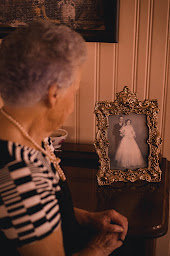

"It's beyond argument that 'habitat' influences every aspect of our well-being." Were this not true, many of the biggest retailers simply wouldn't exist. The influence of the environment is magnified for someone living in care with a dementia and I hope by writing this blog I can encourage people to elevate care surroundings to a higher level of importance. I look forward to comments and conversation whilst I try to encourage more focus on the opportunities I think we're missing."

 |
| Photo by Luiz Medeiros |
For the last 13 years I’ve spent most of my time and effort designing products to support people living with dementia, and one of the first things I learnt was how changes in visual perception are critically influential.
My initial dementia-design challenge was creating internal signs that were highly visible and easier to interpret for people who live with dementia. Essentially I created two types: signs for toilets and bathrooms, and signs that enable people to identify their own room. My designs have been used all around the world and there are literally millions of examples which observe this design – the difference tends to be the quality of materials and execution but they all follow the same visual construct.
Working with the signage took me all over the place and I
met some brilliant people, literally. One particularly brilliant University
professor in Scotland was responsible for my reminiscence epiphany! The first
time we met we talked for maybe three hours and the recurrent theme was, you
guessed it: reminiscence.
The Oxford Dictionary describes the verb to Reminisce as
follows: reminisce (about something/somebody) to think, talk or write about a happy time in your past.
During the drive back to Leeds, a huge penny clanged into
the largely empty vessel between my ears and suddenly I had an overwhelming
sense of the significance of reminiscence for all of us, not just in the
context of a person living with dementia. I didn’t just feel like I understood
it, I could feel the emotion of it. I think the importance of memories is
neatly encapsulated in the phrase: ‘we are our memories’.
Alongside our own personage - that vehicle we need to get around in every day - our memories might be the only thing we truly own. They’re personal, they’re private, they’re ours and they’re unique to every one of us.
The significance of memories is never greater when cognition
becomes impaired and the only reliable memories are older ones. The ability to
recall these memories becomes what defines our personality. Imagine having no
memories at all. You would be a blank page with nothing to show you had ever
existed. This is what is so sad about how some people experience dementia when
they describe their loved one as not ‘being there’ any more, or ‘just a shell’
when they no longer remember who they are.
So memory recall is
priceless and with the right stimulation valuable memories can be reliably
brought to the surface along with all the emotions associated with them, and
herein lies the logic behind some exceptional opportunities. So how can it be
that we do so little to promote reminiscence and why are we surprised when
someone comes to life when they hear a familiar song or see a familiar picture?
The only downside to Reminiscence is that it's so bloody difficult to spell!
Next post: Memory, Music and Emotion
Comments
Post a Comment
Everyone's opinion is valid, but please be polite :-)